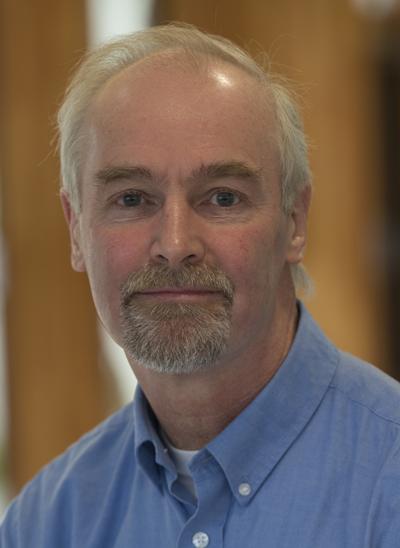Research interests
- Physiology and adaptive mechanisms for survival of pathogens, in vivo and in vitro e.g. Legionella, Helicobacter, E. coli O157, P. aeruginosa, K. pneumoniae, P. mirabilis, MRSA.
- Biofilms in the environment, the built environment and clinical practice.
- Surface contamination, including prions; fouling and corrosion.
- Survival of sublethally damaged pathogens in water and human and animal wastes recycled to agricultural land affecting food security and safety, e.g. E. coli O157, Salmonella, Campylobacter, Listeria, Cryptosporidium
PhD supervision
Callum Highmore: Vitacress Salads ltd & BBSRC Industrial CASE student / Decontamination of biofilm and VBNC zoonotic pathogens on the salad leaf phylloplane for enhanced food security and safety
Thomas Mabey: DSTL student / Biosynthesis of nanomaterials with spectrally selective solar absorptance
Fergus Watson: Royal Commission for Exhibition of 1851 & Bioquell UK Ltd Fellow / Prevalence and relevance of hospital biofilms and their inactivation by hydrogen peroxide vapour technology
Christian Cox: GlaxoSmithKline Consumer Healthcare & BBSRC Industrial CASE student / Ultrasonic Intervention to Effectively Control Dental Plaque Biofilms
Weng Yee Chong: Vitacress Salads ltd student / Invention to improve food safety: Ultrasonic Salad Cleaning
Maryam Malakoutikhah: EPSRC & Ultrawave student / Bubble Management in an Ultrasonic System to Clean using a Water Stream
Daniel Noel: NIHR Southampton Biomedical Research Centre/JVS Products student / Understanding and modulating mechanisms of biocide resistance in clinically important bacteria
Research group
Microbiology
Affiliate research groups
Institute for Life Sciences (IfLS), Network for Anti-Microbial Resistance and Infection Prevention (NAMRIP)
Research project(s)
Biofouling control for in-situ lab-on-a-chip environmental sensors
Using microscopy and molecular community analysis techniques, the effects of antifouling methods will be assessed.
Development of endoscope decontamination procedures
This project will assess the cleanliness of existing endoscopes and the efficacy of current decontamination procedures, using a new highly sensitive microscopy imaging method to identify and quantify residual contamination from a range of flexible endoscopes, and new cell assays to assess potential prion infectivity.
Antimicrobial copper: Biocidal efficacy and killing mechanism of copper and copper alloy dry surfaces against bacterial and viral pathogens
Touch surfaces are an important conduit for transmission of bacteria, viruses and fungi, leading to mass outbreaks of disease in the community and healthcare acquired infections by multiple antibiotic resistant microorganisms causing great morbidity and mortality.
BioliSME II: Demonstration, validation and preliminary promotion of a commercial prototype speedy system for sampling and detecting Listeria monocytogenes
The objective of the work developed by the partner University of Southampton is to firstly optimize the formation of L. monocytogenes biofilms and then conduct experiments to calculate the detachment forces required to remove L. monocytogenes biofilms.
Cold Atmospheric Plasma (CAP) for the decontamination of reusable surgical instruments
To evaluate the potential of Cold Atmospheric Plasma as a tool for the decontamination of reusable surgical instruments and endoscopes, thus significantly reducing the risk of iatrogenic infections with prions and potentially other resilient agents.
Development of anti-fouling strategies for long-term deployed in situ sensors in marine environments
Analysis of biofilms in the marine environment and of the effectiveness of antifouling strategies
Environmental Healthcare Unit Consultancy
Our Consultancy Service has dealt with a wide range of projects in collaboration with both small and large multinational companies. We offer a range of testing services using up-to-date microbiological methods and the latest techniques in specialised microscopy.
Microbial interactions in multi-species drinking water biofilm community
Using the model organism Pseudomonas aeruginosa to investigate mechanisms by which drinking water biofilms harbour important pathogenic microorganism and how these interactions within multi-species biofilms can enhance genetic adaptation and evolution of microbial pathogens.
Rapid assessment of surface contamination and decontamination efficacy
Development of rapid, sensitive, advanced EDIC/EF light microscopy based protocols to assess the efficacy of current bio-decontamination systems.
Role of hypoxia and DNA mismatch repair in tumorigenesis
Using a multicellular tumour spheroid model to investigate the role of hypoxia and DNA mismatch repair on the fundamental processes of importance in tumour development
The role of nitric oxide in the control of biofilm and zoonotic pathogen colonisation of the salad phylloplane
Investigating the use of the signalling molecule nitric oxide for microbial control at the phylloplane
SecurEau – Security and decontamination of drinking water distribution systems following a deliberate contamination event.
This work aims to design novel methodologies for the detection of low levels of contaminants, model the distribution of contaminants throughout a network and identify the point of origin, develop the use of sensors for surveillance and provide decontamination protocols for polluted networks and installations, including the neutralisation of contaminated water and residues.
Prevention and minimisation of biofilms on urinary catheters and equipment
Biofilm development on urinary catheters is a major healthcare issue, leading to infection and blockage. Here we are using advanced microscopy and viability techniques to improve our understanding of biofilm development and persistence on urinary catheters.
Occurrence and horizontal gene transfer of carbapenemase and ESBL genes in soil microbiomes
Understanding the links between lettuce leaf phenotypes and the abundance and diversity of microbes with a view to breeding for improved shelf life and safety
The StarStream device cleans using only room temperature water, ultrasound and air. This CASE award studentship, funded by EPSRC and Ultrawave Ltd., examines method of improving the StarStream by looking at the engineering associated with the water supply components of the device. This entails the design and construction of new bubble diagnostics technology.
Professor Bill KeevilSchool of Biological Sciences
Faculty of Environmental and Life Sciences
Life Sciences Building 85
University of Southampton
Highfield Campus
Southampton
SO17 1BJ
Room Number : 85/4059
